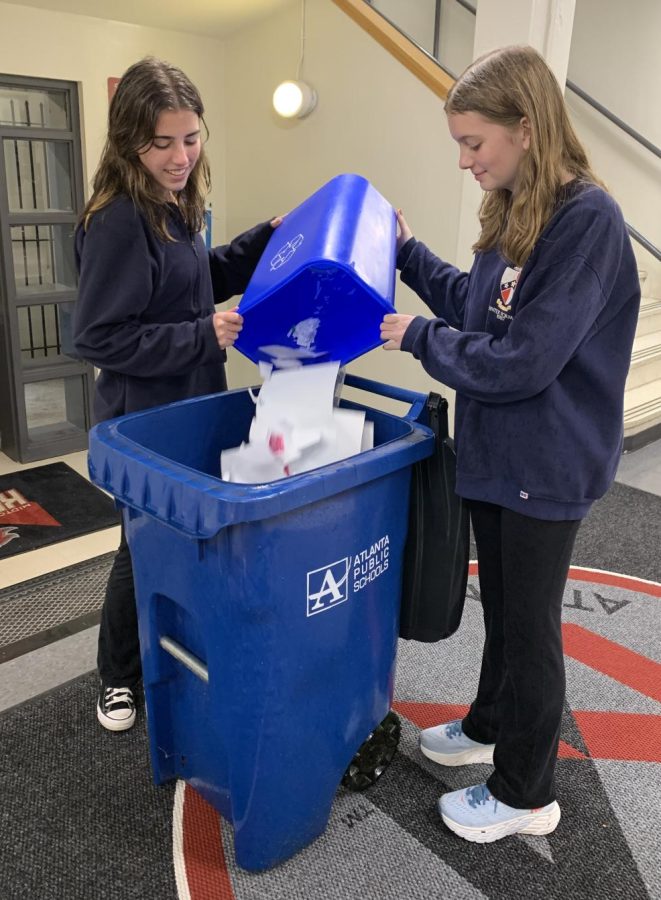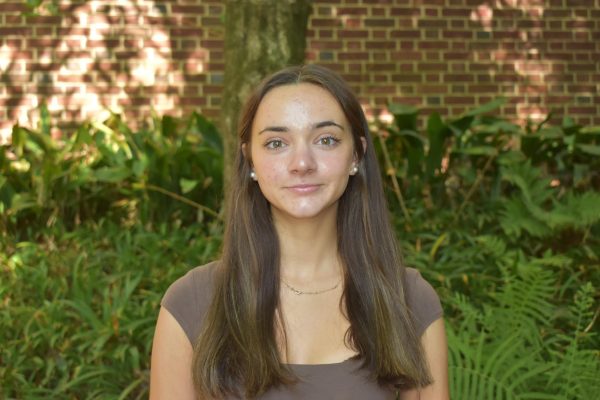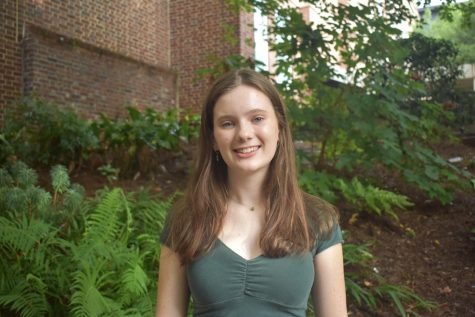Earth Club sophomores initiate school recycling program
Sophomores Eden Sharp (left) and Eva Gustafson (right) empty classroom recycling bins at the end of the day.
December 15, 2022
Sophomores Eva Gustafson and Eden Sharp hope to create a more eco-friendly school by restarting Midtown’s recycling program, which became a casualty of Covid in 2020.
“[Midtown has] had past recycling programs, but in the past few years, people have been trying to reinstate it and failed,” Gustafson said. “Now, we are restarting basically from scratch with a new recycling program.”
To reinstate the program, Gustafson and Sharp identified the causes of the collapse of the past program.
“We started by trying to understand what the past recycling systems were at Midtown and why they had failed,” Sharp said. “We were trying to look for the best possible way to revive this entire program and then make sure it stays so it doesn’t go away like it had in the past.”
During Covid-19, heavy social-distancing mandates were set as in-person schools soon transitioned to virtual learning, leaving few students able to maintain the collecting and disposing of the recycling.
“There was a recycling program at Midtown that occurred daily, but it was before Covid, so once Covid happened, it fell through,” junior Sadie Kyle, Earth Club president, said.“[We] tried to figure out why it fell through and assumed it was a funding problem or lack of student interest.”
Sharp said Earth Club members had previously mentioned bringing back the recycling program but chose to focus on other things, leaving Sharp to consider reviving the program with Gustafson.
“Earth Club had briefly mentioned bringing back the recycling system, but I didn’t know if there were any movements to execute that, so I reached out to Sadie Kyle who connected us to Mr. Sanderson,” Sharp said.
As Gustafson and Sharp were already members of Earth Club, their connection with the club and teacher sponsor, AP Environmental Science teacher Micheal Sanderson, allowed them to accelerate the project.
“He’s helped so much with the recycling [program] and put us in contact with so many people,” Kyle said.
With Sanderson’s help, Gustafson and Sharp connected with more contacts to continue their project.
“[Mr. Sanderson] is the main teacher sponsor and through him we were able to reach out to Dr. Bockman (Principal Dr. Betsy Bockman). She was able to get us contacts with the district who worked in waste management,” Gustafson said.
However, as Sanderson plans to leave at the start of next semester, the Earth Club must take steps towards finding a new sponsor.
“I am going to be leaving next year in January because my wife has an opportunity to work abroad so I’m going to transition from Atlanta to East Africa,” Sanderson said. “They [the club] does need a sponsor; I’m actively looking for someone and I know that there are a lot of teachers who have expressed interests and so I’m confident that we will find someone to be the sponsor.”
Although the club’s sponsor may change, Sanderson says that because they are a student-led organzation, most things should stay the same.
“It won’t affect Earth Club very much at all. One way it would change is that they would just be in a different room,” Sanderson said. “It is a student-led organization so what is exciting about it is that the things that we’ve decided to do at the Earth Club are things that students are creating themselves.”
After he’s gone, Sanderson says he has hopes that Earth Club will retain their qualities as an organization.
“We have presidents, vice-presidents, and someone who sets the schedule, they create the communications, and they ultimately determine what the Earth club is and what it does,” Sanderson said. “I hope for the future of the Earth Club that they continue to make themselves available for anyone interested.”
Although it may take a little while to adjust to recycling, in the long run, their efforts will save money for the school, Sharp said.
“I found out through Dr. Bockman that disposing of the waste in trash bins costs a lot of money, so through recycling, we’d be able to save the school a lot of money along with giving students the option to be able to recycle,” Sharp said. “I know it’s going to be a little hard to adjust in the beginning, but over time people will be able to say, ‘Ok, well this is [recycling] and this is [waste].’”
Gustafson and Sharp faced challenges such as gathering information and organizing their efforts
“I think the most challenging part was starting from scratch because we had absolutely no information, and we didn’t think we could rely on any adults who knew about this except Dr. Bockman,” Sharp said.
The Earth Club is responsible for placing the recycling bins in classrooms to kickoff the program. Unlike the past program, the bins will now be students instead of the custodial staff.
“There’s going to be about 90 bins; at the moment we are focusing on classrooms alone rather than the rest of the school,” Sharp said. “Students will be offered around one to two service hours to go around collecting bins and throwing them into one bigger bin after school.”
Once they have the program up and running, Gustafson and Sharp are planning on expanding the initiative outside of classrooms.
“Once we have the classroom system up and going, we’ll try to do more outside recycling bins, like in the courtyard,” Gustafson said.
Sharp said the bins will have a beneficial long-term effect on Midtown’s sustainability efforts.
“I think this will affect Midtown in a positive way because we are giving people the option to be mindful of what they throw away, and a small difference can make a big impact,”Sharp said.
As Gustafson and Sharp worked together on the project, they found it helpful to have a partner to push one another to continue the project in the face of obstruction.
“I think us working together was like a mutual support system,” Sharp said. “For any project, you start to feel a lack of motivation after a little bit because things aren’t really happening in front of your eyes, and I guess me and Eva were able to keep reminding each other that we had more tasks to do and then we would complete them.”
As the program continues to grow, Gustafson and Sharp are looking into ways to further advance the initiative.
“Right now we’ve been looking at projects relating to the recycling system,” Gustafson said. “There’s a lot of grants for environmental science programs or recycling programs, so we’ve been looking at grants to help with the program.”
Gustafson is optimistic the program will have a positive impact.
“I think overtime we will see a decrease in the overall number of waste going to the landfills from our school, and I hope that recycling becomes an everyday habit for everyone at school,” Gustafson said. “In the long run, I think this program will encourage people to not recycle at school but also at home and maybe inspire more people to be involved in the environment.”








